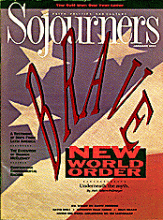Nelsa Curbelo was general coordinator of Servicio Paz y Justicia (Service for Peace and Justice) in Latin America when this article appeared. She lived and worked for many years in a shantytown in Guayaquil, Ecuador. In June 1990, when the indigenous peoples of Ecuador staged a nonviolent uprising demanding land reform and real political participation, Curbelo, along with two Catholic bishops, was asked to form a mediation commission for negotiations with the government.
She delivered this talk at the conference "De Raices--Changing the Face of the Americas" in Oakland, California, on May 5, 1991. It was translated by Sarita Silverman. --The Editors
Three years ago, exhausted from the violence in Colombia, the peasants of Santander Province called upon the army, the death squads, and the guerrillas to sign a peace agreement. Orlando Gaitan, president of the peasants association, said, "We never thought we'd achieve something of this magnitude. We undertook this peace process strictly out of a survival instinct. We were just fed up with being cruelly sacrificed."
The "sacrifice" had begun in the '70s when the Armed Forces of Colombia, a guerrilla group, became active in the area. As always happens in this sort of situation, the army then came in and began repressing the defenseless peasants in an effort to rid the area of the guerrillas. The army arrested people, interrogated them, tortured them, and even killed them. At the same time, the guerrillas were killing those that they suspected of informing on them. In 1980 a paramilitary death squad emerged. That year, the death squad killed 32 people and burned down 12 homes.
Read the Full Article

